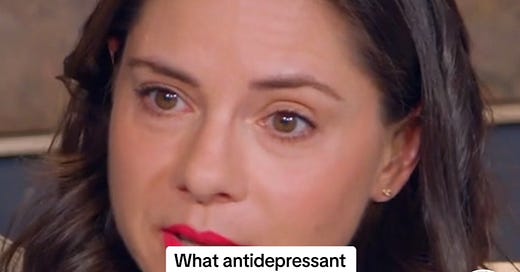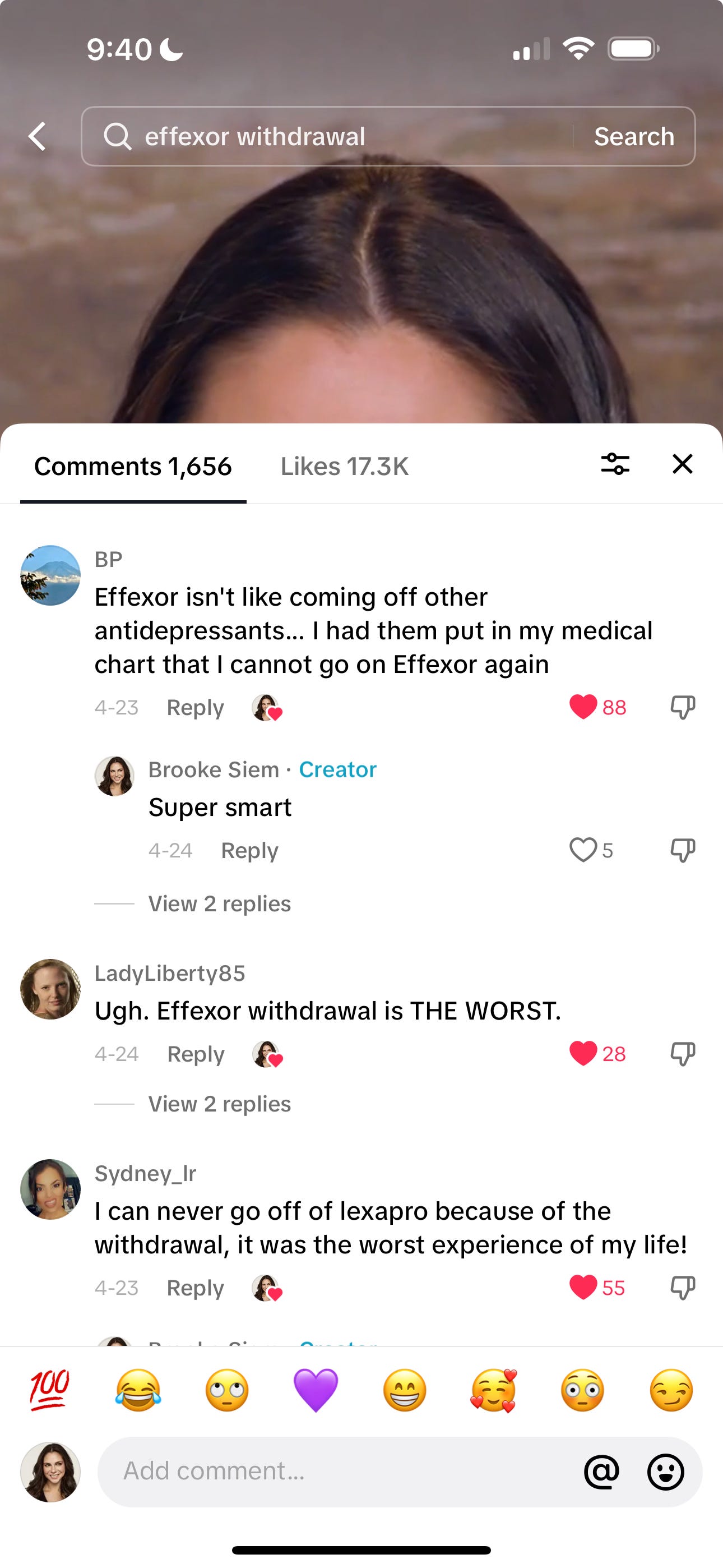Ever since MAY CAUSE SIDE EFFECTS was published in 2022, I’ve done as much press as I can without bankrupting my savings account or my soul. Podcasts are my favorite outlet, and after years of refusing, I finally caved and got on TikTok with the intent of reaching a withdrawal-specific audience.
A few weeks ago, I shared a clip from my episode of Relatable with Allie Beth Stuckey, a massive podcast with loyal listeners. On both Instagram and TikTok, the post blew up, launching me into the weird world of internet virality. In many ways, I’ve been training for this since I started speaking publicly on antidepressant withdrawal in 2018. I’ve honed my message, backed up my personal story with research, and learned how to talk about it without treading into the litigious world of formal medical advice.
Still, nothing quite prepares you for the onslaught of notifications when a post goes viral. Instagram has a short half-life. Viral posts die within a week or so. TikTok is different. The algorithm keeps feeding it back into the funnel, like riding the same ride at the carnival over and over again. Combined, the clip has over half a million views with around two thousand comments.
What I am most surprised by is the lack of pushback compared to the volume of psychiatric horror stories. Typically, anti-antidepressant content generates a decent amount of criticism. Whether it’s my work or someone else’s, you see a lot of, “Antidepressants save lives!” and “Stop shaming people for seeking the treatment they need.” Point out the FDA-supported data suggesting that antidepressants actually take lives in people under 24 and have no effect on suicidality for those 24-65, and I’m usually met by a reductionist, personal anecdote that culminates in, “What you’re doing is DANGEROUS.”
Sometimes people get cranky because I’m not a doctor or researcher, to which they say, “and what are ur credentials?” Unbeknownst to them, this is the one line that makes me doubt what I’m doing, so much so that after some rando made this comment I started researching online masters programs to see if I could get a quickie degree. I’m not bothered because I don’t have letters after my name. I’m bothered because I don’t know what I don’t know. I wonder if my bias is causing me to miss something that could hurt someone. Somehow, my lizard brain thinks having an advanced degree would protect me from that bias, which is ironic because the whole problem with the current standard of care in mental health is that clinicians are blind to the pharma/diagnostic bias programmed into them during their advanced degrees.
Credentials buy you an expensive certificate that says, “I’m good at memorizing the stuff required to pass a test.” The art of medicine or therapy—and the critical thinking required to question why people aren’t getting better despite more intervention—only comes with time and practice. And after 10+ years of by-the-book education, very few practitioners have the self-awareness or balls to say, “I don’t know what I don’t know. I wonder if my bias is causing me to miss something that could hurt someone?”
Thus, millions of people around the world are being hurt by people with letters after their names, yet somehow I’m the problem.
When these comments get to me, I try to remember that being an MD doesn’t shield you from bullshit. Dr. Will Cole, a major player in the functional medicine space, recently shared a post on Instagram about the evidenced-based placebo effect with antidepressants. It garnered so many negative comments that the post is now deleted. Will told me in a podcast we did together that the response made him not want to talk about the topic at all.
For my posts that went viral, the ratio of positive/like minded comments to nasty ones is about 100:1. Whether it’s sample bias from the algorithm or people finally feeling safe to air their grievances about shit doctors and bad drugs, I don’t know. But in the comments of one video, there are over 1600 horror stories just about Effexor. If this were in a specialty that uses lab tests to determine disease, that would be a class action lawsuit. It’s not a class action lawsuit in psychiatry because there aren’t any empirical tests to measure mental and emotional symptoms. A group of people claiming Effexor-induced suicidality cannot prove that Effexor was at fault, and all the pharmaceutical lawyers have to do is point to the patients’ clinical history and blame their suicidality on the depression diagnosis the patient inevitably received. Clever, innit?
The deluge of comments does inspire me to keep chugging along, though. Many folks talk about how they thought they were alone until they stumbled upon my post. This work can feel meaningless because it feels like the needle isn’t moving, and I often wonder if I’m wasting my time. I needed this boost as much as the folks in the comments did.
So, if you’re new to my substack from one of these podcasts, thank you for being here. I’ll keep doing the work if you do.












Share this post